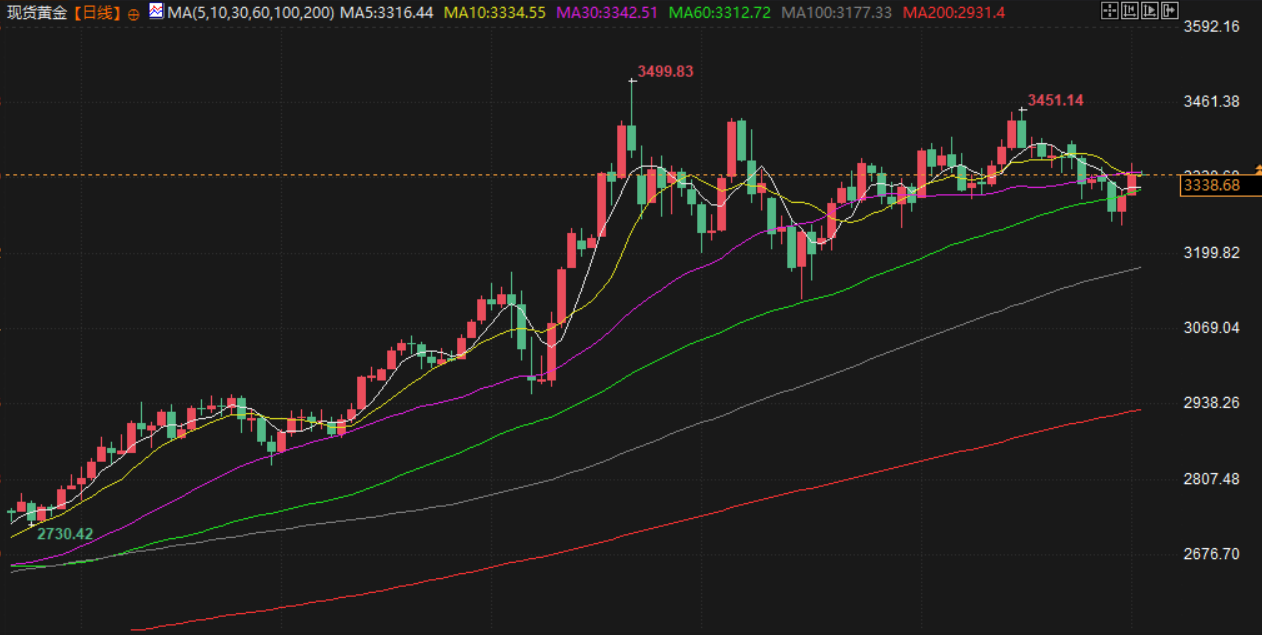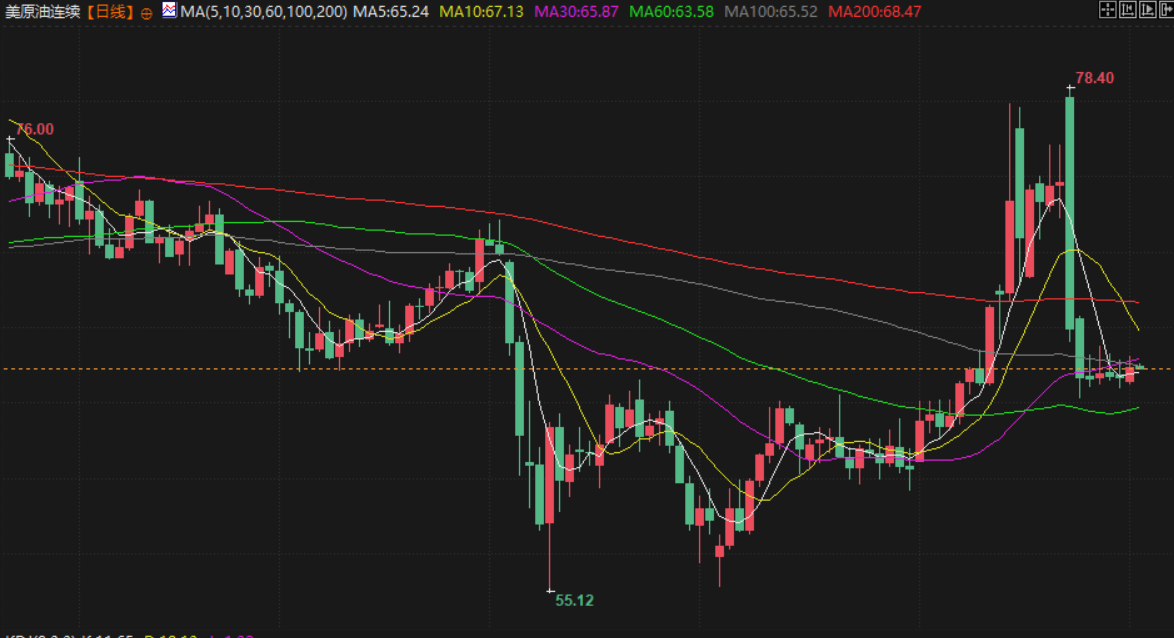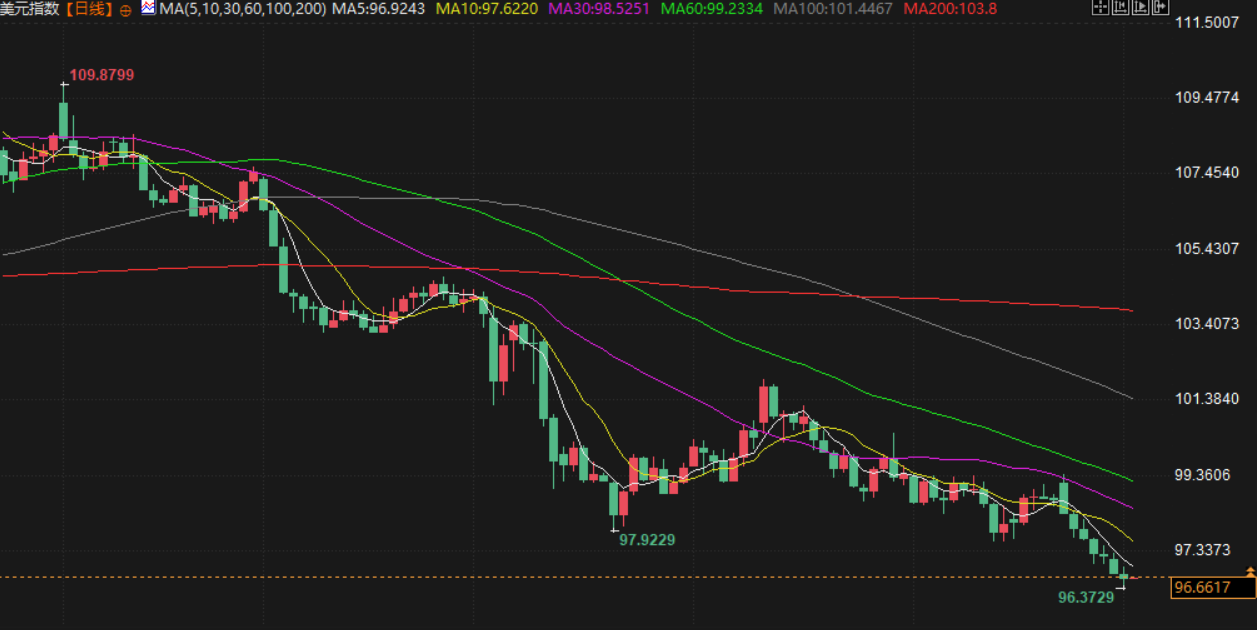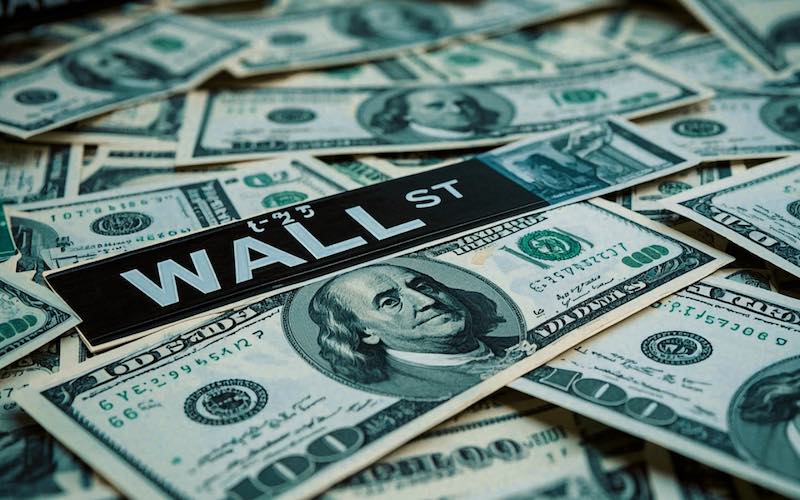July 2 Financial Breakfast: Trump's "Big and Beautiful Bill" passed in the Senate, safe-haven demand boosted gold prices, Powell remained flexible
2025-07-02 07:20:39

Focus on the day

stock market
The Nasdaq and S&P 500 closed lower on Tuesday, dragged down by weakness in large technology stocks, while the Dow Jones Industrial Average closed higher in choppy trading on a day of seasonally low liquidity.
Investors had a choppy day, mixing optimism about stimulus with caution about the market's concentration in a handful of tech stocks. Some mega-cap tech and tech-related momentum stocks have seen particularly big gains in recent weeks but have subsequently sold off, making the market more vulnerable to sharp swings. The NYFANG index, which tracks 10 actively traded tech stocks, fell 1.8%. "Tech and the Nasdaq have reached very overbought levels over the last few weeks, and today you're seeing a massive unwinding of that trade," said Farz Azarm, managing director of equity trading for the Americas at Mizuho.
The Dow Jones Industrial Average rose 0.91% to 44,494.94. The S&P 500 fell 0.11% to 6,198.01. The Nasdaq fell 0.82% to 2,202.89. Optimism was boosted by news from Washington. U.S. President Trump said he was not considering extending the July 9 deadline for countries to negotiate trade with the United States, easing investors' concerns about long-term uncertainty.
Investors weighed the stimulus benefits of Trump's tax bill against its trillion-dollar cost after the Senate passed it. Tesla was hit hard as its CEO Elon Musk rekindled his feud with Trump. Meanwhile, economic data supported the Federal Reserve's patient stance on rate cuts.
Tesla shares fell 5.4 percent as Trump threatened to cut off billions of dollars in federal subsidies for Musk's companies and Musk again criticized Trump's sweeping tax cuts and spending bill.
The blue-chip Dow was boosted by the economically sensitive materials sector and small-cap stocks, which outperformed. The Dow Jones Transportation Index, widely seen as an economic barometer, rose 2.9%, its biggest one-day gain since May 12.
U.S. Treasury prices fell after data showed U.S. job openings unexpectedly increased in May, suggesting the labor market remains resilient despite trade and economic uncertainty, pushing the two-year yield to its highest in nearly a week.
Federal Reserve Chairman Jerome Powell earlier reiterated that the Fed plans to "wait and learn more" about the impact of tariffs on inflation before lowering interest rates, again ignoring Trump's calls for an immediate and significant rate cut.
The Institute for Supply Management (ISM) said its manufacturing Purchasing Managers' Index (PMI) rose slightly to 49.0 in June from a six-month low of 48.5 in May, slightly higher than the 48.8 forecast by economists.
Market focus now turns to Thursday's non-farm payrolls report, which may allow the market to re-price expectations of a rate cut as early as July.
Money markets are pricing in a 21.2% chance of a rate cut in July, with cumulative cuts of around 64 basis points expected by the end of the year, according to the London Stock Exchange Group (LSEG).
Gold Market
Gold prices rose more than 1% on Tuesday as investors sought safe-haven assets after U.S. President Donald Trump's "Big, Beautiful Bill" passed the Senate and a July 9 deadline to suspend trade tariffs drew closer.

Spot gold rose 1% to $3,337.09 an ounce, its highest level since June 24. U.S. gold futures rose 1.3% to $3,350.50.
The Republican-controlled U.S. Senate voted on Tuesday to approve a broad tax cut and spending bill sought by Trump that would cut several social service programs.
"The budget bill that was just passed provides support because it looks like it will increase the deficit by $3 trillion over the next 10 years," said Edward Meir, an analyst at Marex. "This will stimulate inflation to a certain extent, and more importantly, it will increase our debt burden, and we have to repay the debt through more financing and more borrowing, all of which are stronger for the gold market."
U.S. Treasury Secretary Jeff Bessant warned that despite good-faith negotiations, countries could receive notices of significant tariff increases as the July 9 deadline approaches.
Investors are watching U.S. ADP employment data to be released on Wednesday and employment data to be released on Thursday to judge the policy direction of the Federal Reserve.
Fed Chairman Powell said that excluding tariffs, inflation performance is in line with expectations and hopes. The market currently expects the Fed to cut interest rates twice this year, each time by 50 basis points, starting in September.
Rhona O'Connell, head of market analysis for EMEA and Asia at StoneX, said gold prices could average $3,000 an ounce in the fourth quarter and could be even lower by the end of the year.
Spot silver rose 0.2% to $36.15 an ounce, palladium gained 0.1% to $1,095.87 and platinum fell 0.9% to $1,340.80.
Oil Market
Oil prices moved higher on Tuesday as investors digested positive demand indicators while remaining cautious ahead of an OPEC+ meeting to decide the group's production policy for August.

Brent crude settled up 0.6% at $67.11 a barrel, while U.S. crude settled up 0.5% at $65.45 a barrel. Randall Rothenberg, risk intelligence specialist at U.S. oil brokerage Liquidity Energy, said the gains were likely supported by economic data from the Asian powerhouse, and Rothenberg said expectations that Saudi Arabia will raise its August crude prices for Asian buyers to a four-month high and firm premiums for Russia's ESPO blend also supported the view of strong demand.
Crude oil gains were capped by expectations that OPEC+ will raise its August crude output by a similar amount to the large increases agreed in May, June and July. Four OPEC+ sources told Reuters last week that the group plans to increase output by 411,000 barrels per day (bpd) at its July 6 meeting.
Saudi Arabia, de facto leader of the OPEC+ group, boosted its crude exports in June to the highest in a year, according to Kpler data.
Investors were also watching trade talks ahead of a July 9 deadline for U.S. President Donald Trump to grant tariff exemptions. Trump said on Tuesday he was not considering extending the deadline.
Foreign exchange market
The dollar fell against major currencies such as the yen and Swiss franc on Tuesday, but pared losses after data showed better-than-expected growth in labor market demand.

The Republican-controlled U.S. Senate passed President Trump’s tax and spending bill, approving a massive package that would enshrine many of his top priorities into law and add $3.3 trillion to the U.S. debt. The bill now heads to the House of Representatives for final approval.
Federal Reserve Chairman Jerome Powell reiterated at a central bank conference in Portugal on Tuesday that the Fed plans to “wait and learn more” about the impact of tariffs on inflation before cutting interest rates, again brushing off President Trump’s calls for a sharp and immediate rate cut.
The dollar narrowed losses against the yen and Swiss franc after data from the U.S. Labor Department showed that job openings unexpectedly increased by 374,000 to 7.769 million in May. The dollar further narrowed losses against the yen after the U.S. Senate passed a spending bill. The dollar fell 0.29% against the yen to 143.58 yen and 0.16% against the Swiss franc to 0.79175, after falling 0.46% and 0.28% respectively before the data was released.
“This has been the worst first half for the dollar index since 1973 and a lot of that weakness has been driven by concerns about trade policy and worries about a slowing economy, but I think in the short term we may be seeing the market get a little overextended here and I think we could see a rebound in the dollar in July,” said Matthew Weller, global head of market research at StoneX.
The dollar index, which measures the greenback against a basket of currencies including the yen and the euro, fell 0.08% to 96.682 in late New York trading. U.S. Treasury yields rose after the job openings data was released. The benchmark U.S. 10-year Treasury yield rose 2.3 basis points to 4.25%.
"If the Fed cuts, it narrows the spread, and we saw expectations for a rate cut get a little more aggressive in July to 20%; it was 0% a few weeks ago," said Marvin Loh, senior global market strategist at State Street in Boston. "They are definitely going to cut in September, and the tone has changed a little bit."
British Prime Minister Starmer cleared the first hurdle in his quest to overhaul the welfare system, defeating an attempt by lawmakers opposed to the proposed law to block its progress. The proposed changes, aimed at reducing the cost of Britain's growing £65 billion welfare bill, have been described by the government as economically untenable and morally wrong. The euro fell 0.13% to $1.18020, having risen 0.05% earlier in the day.
The pound reversed its earlier losses and rose after the British parliamentary vote. The pound rose 0.07% to $1.374 against the dollar in late New York, rising for two consecutive trading days.
International News
US Department of Defense suspends some promised arms deliveries to Ukraine
On July 1, local time, the U.S. Department of Defense has stopped shipping some anti-aircraft missiles and other precision-guided weapons to Ukraine due to concerns about low U.S. weapons inventories. People familiar with the matter revealed that the total amount of U.S. artillery shells, anti-aircraft missiles and precision-guided weapons is decreasing. The initial decision to suspend some aid to Ukraine was made in early June, but it has not taken effect until now. (CCTV)
Mexico's oil production falls to late 1970s levels
Mexico’s oil production is falling sharply to levels seen in the late 1970s, posing a threat to U.S. refiners, especially during the summer driving season when Mexican oil is needed most. The production decline, coupled with an expansion at Mexico’s largest refinery, Dos Bocas, has reduced supplies to overseas markets. Mexico’s exports plunged to a record low of 529,000 barrels per day in June, according to shipping reports and vessel movements compiled by Reuters. Mexico’s average daily oil production this year of 1.621 million barrels would be the lowest since 1979, when the giant Cantarell field produced oil for the first time. Mexico has been unable to find another field the size of Cantarell’s 35 billion barrels of oil.
Trump: Not considering extending the deadline for tariff talks, may raise Japan tariffs
U.S. President Donald Trump said on Tuesday he was not considering extending the July 9 deadline for countries to negotiate a trade deal with the United States, and expressed doubts about whether a deal could be reached with Japan. "We've dealt with Japan. I'm not sure we can make a deal. I doubt it," Trump said. Trump said he might impose tariffs of "30%, 35% or whatever number we decide" on goods imported from Japan, which is much higher than the 24% rate he announced on April 2.
Trump administration officially shuts down USAID
The Trump administration of the United States announced on the 1st that it would officially shut down the United States Agency for International Development, which had been in operation for nearly 64 years. U.S. Secretary of State Rubio issued a statement on the same day saying that the United States Agency for International Development would officially stop carrying out foreign aid missions from the 1st, and some remaining projects that were in line with the Trump administration's policies would be transferred to the U.S. State Department for implementation. The statement said that the United States Agency for International Development has spent more than $715 billion over the past decades and used American taxpayers' money to create a "global non-governmental organization industrial complex", but since the end of the Cold War in the 1990s, its work has "achieved little... (aided regions) development goals are rarely achieved, instability is often exacerbated, and anti-American sentiment is only increasing." The statement said that the United States' humanitarian aid and overseas economic development projects must serve the "America First" foreign policy. (Xinhua News Agency)
"Federal Reserve Megaphone": Powell maintains flexibility as factors in rate cut decision-making change
Nick Timiraos, the Fed's "megaphone," said Powell dodged a pointed question about July, refusing to rule out anything four weeks before the policy meeting. His overall comments showed little that he was preparing for a rate cut this month. The "excessive" focus on July (at least today) is misplaced and could obscure more subtle changes in his and others' rhetoric in recent weeks. After the Liberation Day tariffs, there was speculation that price increases might be so large that it would require substantial labor market weakness to cut rates. But more recently, with the tariffs on hold and early (perhaps too early?) inflation readings not showing a meaningful impact, Powell has hinted that rate cuts could be resumed if inflation is not as bad as feared.
U.S. Senate passes "Big and Beautiful" bill
On July 1, local time, the U.S. Senate passed a comprehensive tax cut and spending bill and submitted it to the House of Representatives. The U.S. Senate passed the comprehensive tax cut and spending bill proposed by U.S. President Trump with a vote of 51 to 50 that morning. During this period, senators voted on dozens of proposed legislative amendments. Republican Vice President Vance, who also serves as the president of the Senate, cast a "deadlock-breaking" vote in a "tie" of 50 votes in favor and 50 votes against, and the amendment was passed with a vote of 51 to 50. The revised bill, which Trump called "big and beautiful," will now return to the House of Representatives, and House Speaker Mike Johnson will strive to pass the bill before the July 4 deadline set by Trump. (CCTV)
Bank of Japan Governor hints at no rate hike for now, says balance sheet reduction may not be completed before leaving office
Bank of Japan Governor Kazuo Ueda stressed a wait-and-see stance, saying he would wait for more data before deciding on the next monetary policy, suggesting he was not in a hurry to raise borrowing costs for the time being. "We need more inflation data to make a judgment," he said at the European Central Bank's annual meeting in Sintra, Portugal. He mentioned that the central bank is paying attention to the strength of core inflation, the impact of US tariffs, and food inflation, which is expected to gradually ease. Ueda also said that he might not be able to achieve his goal of reducing the balance sheet before the end of his term.
Fed Chairman Powell: Tariff uncertainty leads to delayed rate cuts
On July 1, local time, Federal Reserve Chairman Powell attended a meeting in Sintra, Portugal, saying that if it were not for US President Trump's tariff policy, the Federal Reserve would have started to cut interest rates in 2025 and would have adopted a more relaxed monetary policy at present. When asked whether the uncertainty caused by the current tariff system of the US government has caused the Federal Reserve to postpone the interest rate cut, Powell gave an affirmative answer, adding that almost all forecasts for US inflation rates have risen sharply due to the impact of tariffs. Powell admitted that despite the increasing pressure from the US government, the Federal Reserve has entered a mode of maintaining interest rates. Powell also said that given the instability of the current economic outlook, the Federal Reserve is still watching the situation to learn more. In addition, when asked about the possibility of a rate cut in July, Powell said that he would not rule out any possibility or "put it on the table directly", which would depend on how the data evolves. Powell said that the "vast majority" of members of the Federal Reserve's interest rate-setting committee do expect that it would be appropriate to cut interest rates again later this year.
Domestic News
my country's vegetable seed self-sufficiency rate is close to 91% and tomato breeding chips will be launched this year
It is understood that my country's vegetable seed self-sufficiency rate is close to 91%, which effectively guarantees the richness of the "vegetable basket". In the laboratory of Beijing Tongzhou International Seed Industry Park, staff showed reporters the domestic solid-phase chip detection equipment and solid-phase chips that were just successfully developed this year. Based on this breakthrough in chip technology, they launched the country's first independent tomato breeding solid-phase gene chip project in May this year. It is understood that the tomato breeding chip they developed is expected to be launched at the end of this year. After formal commercial application, the cost of genetic testing will be reduced from 120 yuan per sample to 40 yuan, and the scope of application will cover upstream tomato molecular breeding, variety selection, and downstream variety identification. (CCTV)
- Risk Warning and Disclaimer
- The market involves risk, and trading may not be suitable for all investors. This article is for reference only and does not constitute personal investment advice, nor does it take into account certain users’ specific investment objectives, financial situation, or other needs. Any investment decisions made based on this information are at your own risk.










